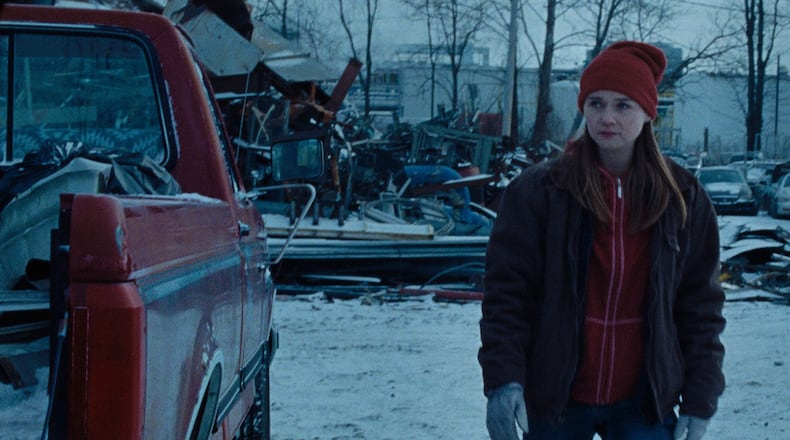Her movie is being paired with “We Still Make Things,” a short film directed by WSU grad Ian Cook.
“This is a dynamite combo that showcases the incredible amount of talent still coming from Wright State’s motion picture department,” says Jonathan McNeil, The Neon’s general manager.
Riegel’s professors knew her as someone who was “very, very inquisitive.”
William Lafferty, associate professor emeritus of motion pictures at the school, describes his former student as “intellectually curious, not just in terms of film, in terms of everything.” She was, he remembers, very energetic, always asking for book recommendations.
Lafferty, who taught theory and history of film, says a top-notch filmmaker is one who chooses the right major influences. “Nobody can do anything new,” he insists. “You have to look at what directors and writers you admire, what they do that touches you intellectually and emotionally at the gut level and try to synthesize that into your work.”
He says that’s why Riegel always wanted to learn more. “I think she wanted more and more influences she could look at and either accept and reject,” he says.
Riegel’s inspiration, he observes, came from directors like Sam Peckinpah, best known for his Western epic “The Wild Bunch,” and Nicholas Ray, well known for “Rebel Without a Cause.” As an instructor, Lafferty focused on teaching about both of those famous directors. He remembers Riegel being particularly interested in themes of violence and misogyny.
Charles Derry, who coordinated the motion pictures program at WSU for many years, has similar memories of Riegel.
“She was the most single-minded and focused of all my students,” he recalls. “Most students came to school wanting to be a director; Nicole said she wanted to be a screenwriter. I’ve only had two students who immediately expressed that desire.”
In her years at Wright State, Derry adds, there was no one who knocked on his door more frequently to talk to him about her work and ask for additional work. “Nicole,” he says, “was unstoppable. "
‘Holler’ is semi-autobiographical
“Holler” takes place in Jackson, Ohio, Riegel’s hometown, where American manufacturing and opportunity have been drying up. Although the lead actors are professionals, many of those in the film are local folks.
Ruth, the main character, is a bright and curious young woman hoping to go to college. In order to pay her anticipated expenses, she joins a dangerous scrap metal crew. She and her devoted brother spend a brutal winter working the scrap yards during the day and stealing and selling metal from the factories at night. The film involved working in scrap yards, operational food factories and asking real scrap crews to take them into defunct factories.
“We pass girls like Ruth every day in towns all across America, but we never really consider what is going on in their lives, their struggles at home, their hopes and their dreams,” says Riegel who, in her director’s statement says she herself was vulnerable in a system that felt rigged against her, especially when it came to access to education for young people living in the margins.
“That lack of access made me feel like my voice didn’t matter and that is a horrible feeling for any young girl to carry with her,” she says. “In order to pursue the life that I wanted, I had to leave behind the family and community that created me which felt like a betrayal.”
Riegel hopes audience members will think about the Ruths who are slipping through the cracks. “I especially hope that the Ruths who see the film feel like they have been seen and that it inspires in them a sense of possibility.”
Credit: CONTRIBUTED
Credit: CONTRIBUTED
‘We Still Make Things’ a pandemic story
Ian Cook, director of “We Still Make Things,” has created a 13-minute film about a group of people who came together to solve a PPE shortage at Miami Valley Hospital during the early days of the pandemic. You may see some familiar community faces as they race to fill the hospital gown shortage at the hospital.
“In April 2020, documentary filmmakers Julia Reichert and Steve Bognar gathered a group of documentary filmmakers via Zoom to discuss local storylines unfolding in the early days of the pandemic,” Cook relates. “The PPE supply chain was falling apart across the country, and when we heard about the PPE situation unfolding at Miami Valley Hospital and the team that had come together to help solve it, I jumped in to get the camera rolling.”
In that very strange and trying moment, he says, all these Dayton-area organizations were putting their minds together, and he was excited to capture that spirit of innovation in real time.
“I’m so grateful to have the film playing at The Neon as the world re-opens,” Cook says. “After such a difficult year, I hope audiences walk away with a renewed appreciation for our city, and enjoy a positive story about Dayton coming together to protect its people.”
HOW TO GO
What: “Holler” and “We Still Make Things”
Where: The Neon, 130 E. 5th St., Dayton
When: 1:30 p.m. and 7:30 p.m. today, 3:15 p.m. and 7:15 p.m. Monday through Thursday
More info: www.neonmovies.com or (937) 222-7469
About the Author



